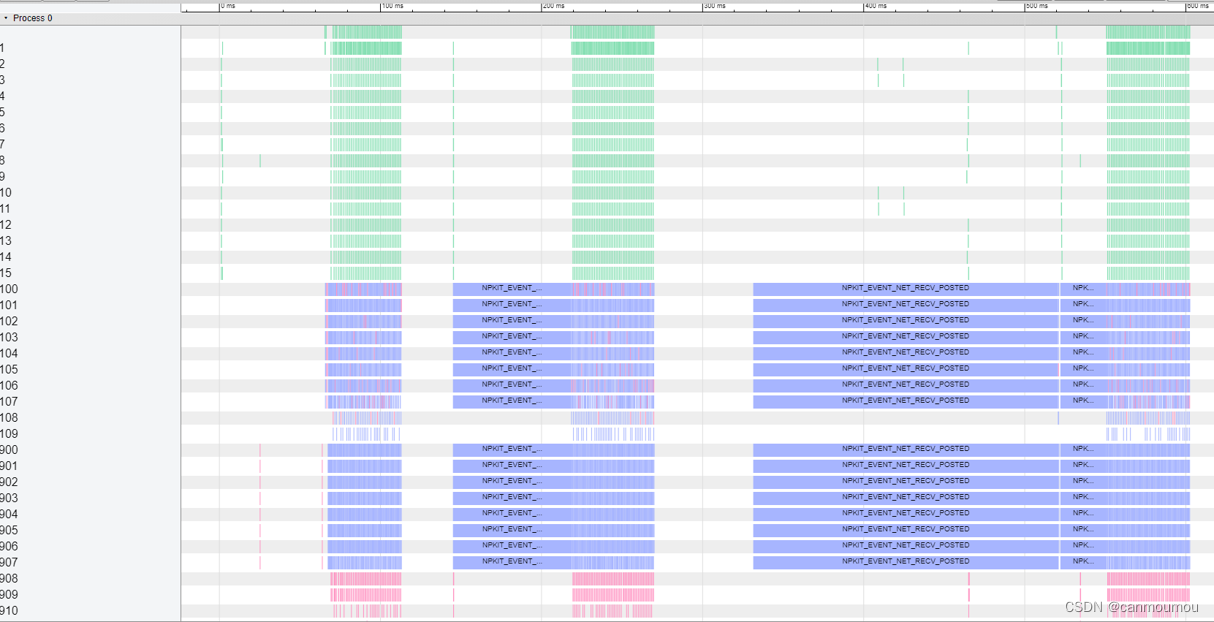本文主要是介绍【分布式通信】NPKit,NCCL的Profiling工具,希望对大家解决编程问题提供一定的参考价值,需要的开发者们随着小编来一起学习吧!
NPKit介绍
NPKit (Networking Profiling Kit) is a profiling framework designed for popular collective communication libraries (CCLs), including Microsoft MSCCL, NVIDIA NCCL and AMD RCCL.
It enables users to insert customized profiling events into different CCL components, especially into giant GPU kernels.
These events are then automatically placed onto a unified timeline in Google Trace Event Format, which users can then leverage trace viewer to understand CCLs’ workflow and performance.
以NCCL为例,如何使用?
Usage
-
NCCL 2.17.1-1版本,将文件夹下的
npkit-for-nccl-2.17.1-1.diff添加到你的nccl源文件中。 -
NPKit只有在CPU和GPU没以后overlap的时候使用,所以
NPKIT_FLAGS也要遵从这个规则。同时npkit_launcher.sh里面的参数也要对应正确。 -
nccl_test和npkit_runner.sh对应参数正确. 仅支持每个线程有1个GPU, 因此nccl_test运行参数记得是-g 1 -
运行
bash npkit_launcher.sh. -
生成文件
npkit_event_trace.json,可以用谷歌浏览器打开看。在浏览器那一栏输入chrome://tracing, 然后打开对应文件即可。

import argparse
import os
import jsonfrom queue import Queuedef parse_npkit_event_header(npkit_event_header_path):npkit_event_def = {'id_to_type': {}, 'type_to_id': {}}with open(npkit_event_header_path, 'r') as f:lines = [x.strip() for x in f.readlines() if len(x.strip()) != 0]line_idx = 0while line_idx < len(lines):if lines[line_idx].startswith('#define NPKIT_EVENT_'):fields = lines[line_idx].split()if len(fields) == 3:event_type = fields[1]event_id = int(fields[2], 0)npkit_event_def['type_to_id'][event_type] = event_idnpkit_event_def['id_to_type'][event_id] = event_typeline_idx += 1return npkit_event_defdef parse_gpu_clock_scale(gpu_clock_file_path):with open(gpu_clock_file_path, 'r') as f:freq_in_khz = f.read()return float(freq_in_khz) * 1e3 / 1e6def parse_cpu_clock_scale(cpu_clock_den_file_path, cpu_clock_num_file_path):with open(cpu_clock_num_file_path, 'r') as f:num = float(f.read())with open(cpu_clock_den_file_path, 'r') as f:den = float(f.read())return den / num / 1e6def parse_gpu_event(event_bytes):return {'id': int.from_bytes(event_bytes[0:1], byteorder='little', signed=False),'size': int.from_bytes(event_bytes[1:5], byteorder='little', signed=False),'rsvd': int.from_bytes(event_bytes[5:8], byteorder='little', signed=False),'timestamp': int.from_bytes(event_bytes[8:16], byteorder='little', signed=False)}def parse_cpu_event(event_bytes):return {'id': int.from_bytes(event_bytes[0:1], byteorder='little', signed=False),'size': int.from_bytes(event_bytes[1:5], byteorder='little', signed=False),'slot': int.from_bytes(event_bytes[5:8], byteorder='little', signed=False),'timestamp': int.from_bytes(event_bytes[8:16], byteorder='little', signed=False)}def parse_gpu_event_file(npkit_dump_dir, npkit_event_def, rank, buf_idx, gpu_clock_scale, cpu_clock_scale):gpu_event_file_path = os.path.join(npkit_dump_dir, 'gpu_events_rank_%d_buf_%d' % (rank, buf_idx))raw_event_size = 16curr_cpu_base_time = Nonecurr_gpu_base_time = Nonegpu_events = []event_type_to_seq = {}with open(gpu_event_file_path, 'rb') as f:raw_content = f.read()raw_content_size = len(raw_content)raw_content_idx = 0while raw_content_idx < raw_content_size:parsed_gpu_event = parse_gpu_event(raw_content[raw_content_idx : raw_content_idx + raw_event_size])if npkit_event_def['id_to_type'][parsed_gpu_event['id']] == 'NPKIT_EVENT_TIME_SYNC_CPU':curr_cpu_base_time = parsed_gpu_event['timestamp'] / cpu_clock_scalecurr_gpu_base_time = Noneelif npkit_event_def['id_to_type'][parsed_gpu_event['id']] == 'NPKIT_EVENT_TIME_SYNC_GPU':if curr_gpu_base_time is None:curr_gpu_base_time = parsed_gpu_event['timestamp'] / gpu_clock_scaleelse:if curr_gpu_base_time is None:curr_gpu_base_time = parsed_gpu_event['timestamp'] / gpu_clock_scaleevent_type = npkit_event_def['id_to_type'][parsed_gpu_event['id']]phase = 'B' if event_type.endswith('_ENTRY') else 'E'gpu_events.append({'ph': phase,'ts': curr_cpu_base_time + parsed_gpu_event['timestamp'] / gpu_clock_scale - curr_gpu_base_time,'pid': rank,'tid': buf_idx + 1})if phase == 'B':if event_type not in event_type_to_seq:event_type_to_seq[event_type] = 0gpu_events[-1].update({'name': event_type,'cat': 'GPU','args': {'rank': rank,'buf_idx': buf_idx,'seq': event_type_to_seq[event_type],'rsvd_0': parsed_gpu_event['rsvd'],'size_0': parsed_gpu_event['size']}})event_type_to_seq[event_type] += 1else:gpu_events[-1]['args'] = {'size': parsed_gpu_event['size'], 'rsvd': parsed_gpu_event['rsvd']}delta_time = gpu_events[-1]['ts'] - gpu_events[-2]['ts']gpu_events[-1]['args']['bw (GB/s)'] = 0. if delta_time == 0. else gpu_events[-1]['args']['size'] / delta_time / 1e3raw_content_idx += raw_event_sizereturn gpu_eventsdef parse_cpu_event_file(npkit_dump_dir, npkit_event_def, rank, channel, cpu_clock_scale):cpu_event_file_path = os.path.join(npkit_dump_dir, 'cpu_events_rank_%d_channel_%d' % (rank, channel))raw_event_size = 16cpu_events = []event_type_to_seq = {}fiber_is_usable = []fiber_open_ts = []slot_to_fiber_id = {}channel_shift = 1000with open(cpu_event_file_path, 'rb') as f:raw_content = f.read()raw_content_size = len(raw_content)raw_content_idx = 0while raw_content_idx < raw_content_size:parsed_cpu_event = parse_cpu_event(raw_content[raw_content_idx : raw_content_idx + raw_event_size])event_type = npkit_event_def['id_to_type'][parsed_cpu_event['id']]phase = 'B' if event_type.endswith('_ENTRY') else 'E'cpu_events.append({'ph': phase,'ts': parsed_cpu_event['timestamp'] / cpu_clock_scale,'pid': rank})slot = parsed_cpu_event['slot']if phase == 'B':# Open fiber eventfiber_id = 0while fiber_id < len(fiber_is_usable):if fiber_is_usable[fiber_id]:breakfiber_id += 1if fiber_id == len(fiber_is_usable):fiber_is_usable.append(True)fiber_open_ts.append(0.0)slot_to_fiber_id[slot] = fiber_idfiber_open_ts[fiber_id] = cpu_events[-1]['ts']fiber_is_usable[fiber_id] = Falseif event_type not in event_type_to_seq:event_type_to_seq[event_type] = 0cpu_events[-1].update({'name': event_type,'cat': 'CPU','args': {'rank': rank,'channel': channel,'slot': parsed_cpu_event['slot'],'seq': event_type_to_seq[event_type],'size_0': parsed_cpu_event['size']}})event_type_to_seq[event_type] += 1else:# Close fiber eventfiber_id = slot_to_fiber_id[slot]slot_to_fiber_id.pop(slot)last_ts = fiber_open_ts[fiber_id]fiber_is_usable[fiber_id] = Truedelta_time = max(0.001, cpu_events[-1]['ts'] - last_ts)cpu_events[-1]['args'] = {'size': parsed_cpu_event['size']}cpu_events[-1]['args']['bw (GB/s)'] = 0. if delta_time == 0. else cpu_events[-1]['args']['size'] / delta_time / 1e3cpu_events[-1]['tid'] = fiber_id + (channel + 1) * channel_shiftraw_content_idx += raw_event_sizereturn cpu_eventsdef convert_npkit_dump_to_trace(npkit_dump_dir, output_dir, npkit_event_def):files_in_dump_dir = next(os.walk(npkit_dump_dir))[2]gpu_event_files = [x for x in files_in_dump_dir if x.startswith('gpu_events_rank_')]cpu_event_files = [x for x in files_in_dump_dir if x.startswith('cpu_events_rank_')]ranks = list(set([int(x.split('_rank_')[1].split('_')[0]) for x in gpu_event_files]))buf_indices = list(set([int(x.split('_buf_')[1].split('_')[0]) for x in gpu_event_files]))channels = list(set([int(x.split('_channel_')[1].split('_')[0]) for x in cpu_event_files]))trace = {'traceEvents': []}for rank in ranks:cpu_clock_den_file_path = os.path.join(npkit_dump_dir, 'cpu_clock_period_den_rank_%d' % rank)cpu_clock_num_file_path = os.path.join(npkit_dump_dir, 'cpu_clock_period_num_rank_%d' % rank)cpu_clock_scale = parse_cpu_clock_scale(cpu_clock_den_file_path, cpu_clock_num_file_path)gpu_clock_file_path = os.path.join(npkit_dump_dir, 'gpu_clock_rate_rank_%d' % rank)gpu_clock_scale = parse_gpu_clock_scale(gpu_clock_file_path)for buf_idx in buf_indices:gpu_events = parse_gpu_event_file(npkit_dump_dir, npkit_event_def, rank, buf_idx, gpu_clock_scale, cpu_clock_scale)trace['traceEvents'].extend(gpu_events)for channel in channels:cpu_events = parse_cpu_event_file(npkit_dump_dir, npkit_event_def, rank, channel, cpu_clock_scale)trace['traceEvents'].extend(cpu_events)trace['traceEvents'].sort(key=lambda x : x['ts'])trace['displayTimeUnit'] = 'ns'os.makedirs(output_dir, exist_ok=True)with open(os.path.join(output_dir, 'npkit_event_trace.json'), 'w') as f:json.dump(trace, f)if __name__ == '__main__':parser = argparse.ArgumentParser()parser.add_argument('--npkit_dump_dir', type=str, required=True, help='NPKit dump directory.')parser.add_argument('--npkit_event_header_path', type=str, required=True, help='Path to npkit_event.h.')parser.add_argument('--output_dir', type=str, required=True, help='Path to output directory.')args = parser.parse_args()npkit_event_def = parse_npkit_event_header(args.npkit_event_header_path)convert_npkit_dump_to_trace(args.npkit_dump_dir, args.output_dir, npkit_event_def)这篇关于【分布式通信】NPKit,NCCL的Profiling工具的文章就介绍到这儿,希望我们推荐的文章对编程师们有所帮助!






